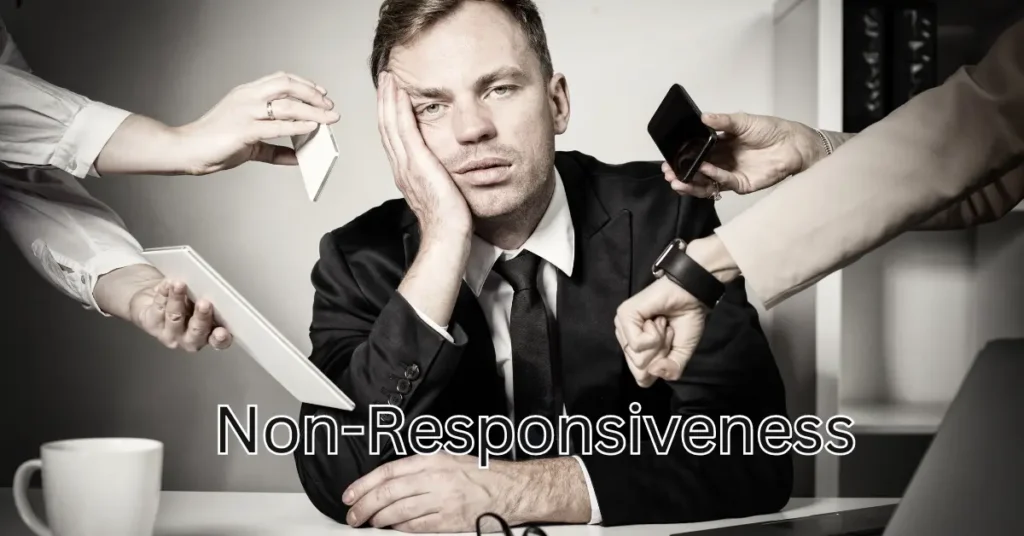What to Do When Tenant Does Not Respond? Rental Awareness
When a tenant does not respond, the landlord should try to reach out to them in various ways such as phone calls, emails, and written notices. If there is no response from the tenant, the landlord should proceed with legal action.
It is crucial for landlords to follow the laws in their area and take proper steps to handle the situation. Failure to do so may result in legal consequences for the landlord.
This article will cover some steps landlords can take to try and get in touch with delinquent tenants and what legal action can be taken if necessary.

Understanding The Problem
The Importance Of A Tenant Response
As a landlord, it’s crucial to receive prompt responses from your tenants. Here’s why:
- Timely communication helps you avoid misunderstandings and complications down the road.
- It helps establish trust and builds a healthy rapport between you and your tenant.
- It helps you address concerns that might escalate into issues if left unattended.
Common Reasons For Tenant Non-Responsiveness
Non-responsiveness from tenants can arise from different causes, including:
- Technical difficulties: Internet or phone issues can make communication a challenge.
- Schedule challenges: Tenants might work unconventional hours or be out of town, making it troublesome to get hold of them.
- Personal factors: Tenants may be dealing with personal issues that hinder their ability to communicate with you.
Stages Of Non-Responsiveness: When To Take Action
If a tenant has been unresponsive for some time, it’s crucial to act accordingly. Here are some stages to consider:
- Initial stage: Sending follow-up messages through email, text, or voicemail can help remind them to respond.
- Escalation stage: If you haven’t received a response after several attempts, you can consider other means of communication, such as through a mutual contact.
- Legal stage: If the tenant remains unresponsive and breaches the lease agreement, you may consider legal options.
Remember, always exhaust all possible communication methods before escalating to the legal stage. Good communication and mutual understanding can avoid most legal conflicts.

Taking Action
What To Do When Tenant Does Not Respond
As a landlord, the unresponsiveness of a tenant can be a daunting challenge to deal with. You may have tried several means to reach them without any success, and this has put you in a fix. The good news is, you have options to address this issue.
Here are some steps to take when your tenant is unresponsive.
Contacting The Tenant: Best Practices
When a tenant stops responding, it’s essential to act promptly while still adhering to legal requirements. Here are a few best practices for contacting your tenant:
- Send a formal letter to inform them about the situation and any legal action you may take if they fail to respond.
- Make sure the letter is addressed to their current address and sent through certified mail that requires a signature upon delivery.
- Follow up with a call or email to confirm if they received the letter and emphasize the importance of their response.
Legal Obligations And Options
As a landlord, you have legal obligations, and your tenant has legal rights. Ignoring these legal requirements could land you in legal trouble. Here are some legal obligations and options when a tenant doesn’t respond:
- Review your lease agreement to ensure you’re not violating any tenant rights or contract provisions.
- Consider filing a court case if your tenant has been missing for an extended period and hasn’t paid rent. In some states, filing a case can be done only after 30 days of non-payment of rent.
- Inquire about your state’s eviction laws and rules to determine the next steps if your tenant is unresponsive.
Renter’S Rights And Laws
Tenants have rights, and landlords must abide by the laws that govern tenant-landlord relationships. Here are a few points for renters’ rights and laws:
- Although tenants must be responsive, they have a right to receive proper notice before any legal action is taken.
- Harassment or illegal attempts to evict a tenant is a punishable offense.
- If your landlord takes illegal action against you, you have a legal right to seek a court injunction.

Eviction And Abandonment
In some cases, a tenant may have abandoned their rental unit, making eviction the only option. Here are some critical points to consider:
- If the tenant hasn’t paid rent for an extended period, you have the right to file for eviction and recover rent payment and damages.
- Document the condition of the rental unit and collect evidence if you think a tenant has abandoned the property.
- Review state and local laws about eviction and consult with a lawyer before taking legal action.
Hiring A Property Manager Or Collection Agency
Hiring a property manager or a collection agency is an option if you can’t resolve the issue directly. Here are some things to consider:
- Hiring a reputable property manager can help you navigate tenant issues.
- A collection agency can help recover unpaid rent and bills.
- It’s essential to review your rental agreement to ensure hiring a property manager or a collection agency is allowed.
Responding promptly and rationally when a tenant does not respond is essential. Avoid taking actions that may violate tenant rights or the law.
Familiarizing yourself with tenant-landlord laws and reviewing your lease agreement can help you take appropriate action.
Preventing Non-Responsiveness In The Future
As a landlord, dealing with non-responsive tenants can be frustrating. Fortunately, there are steps you can take to prevent non-responsiveness in the future. Here are some essential strategies to implement:
Best Practices For Communication Between Landlords And Tenants
Effective communication is crucial to maintaining a positive landlord-tenant relationship and preventing non-responsiveness. Here are some best practices for communication between landlords and tenants:
- Establish clear lines of communication through phone, email, or messaging apps.
- Respond to tenant messages and inquiries in a timely manner.
- Provide regular updates about property maintenance and repairs.
- Schedule routine property inspections and communicate the schedule to tenants in advance.
- Clearly communicate policies on rent payment, late fees, and other aspects of the rental agreement.
Strategies For Screening Prospective Tenants
Finding the right tenant from the beginning is essential to preventing non-responsiveness in the future. Implement these effective strategies to screen prospective tenants:
- Conduct thorough tenant background checks, including criminal history, credit scores, and eviction history.
- Verify employment and income to ensure tenants can afford rent payments.
- Request references from previous landlords or employers.
- Interview prospective tenants to gauge their communication skills and determine whether they will be reliable renters.

Creating Clear Expectations And Consequences
Clear expectations and consequences can encourage tenants to be more responsive and responsible. Consider these tips for creating expectations and consequences for renters:
- Include specific language in the rental agreement regarding communication protocols, maintenance responsibilities, and consequences for late rent payments.
- Outline fees or penalties for late rent payments.
- Clearly communicate the consequences of lease violations, including eviction.
By implementing these strategies, landlords can avoid non-responsiveness and ensure a positive relationship with tenants.
Frequently Asked Questions For What To Do When Tenant Does Not Respond
What Should I Do If My Tenant Is Not Responding To My Calls?
Contact them through other available methods such as email or text, and document all communication attempts.
How Long Should I Wait Before Taking Legal Action Against A Non-Responsive Tenant?
It ultimately depends on the situation, but typically, giving the tenant a written notice and waiting 30 days is recommended.
Can A Non-Responsive Tenant Be Evicted Without Going Through The Court System?
No, eviction requires going through the court system and obtaining a court order.
What Are Some Potential Reasons Why A Tenant May Not Be Responding?
They may be facing personal issues, or they may be avoiding communication due to an upcoming lease termination or rent increase.
Conclusion
When you’re left hanging by an unresponsive tenant, don’t fret. Remember to respect their privacy, send gentle reminders, and ultimately use legal channels if needed.
With patience, transparency, and adherence to laws, you can turn silence into constructive conversation, safeguarding your property and peace of mind.